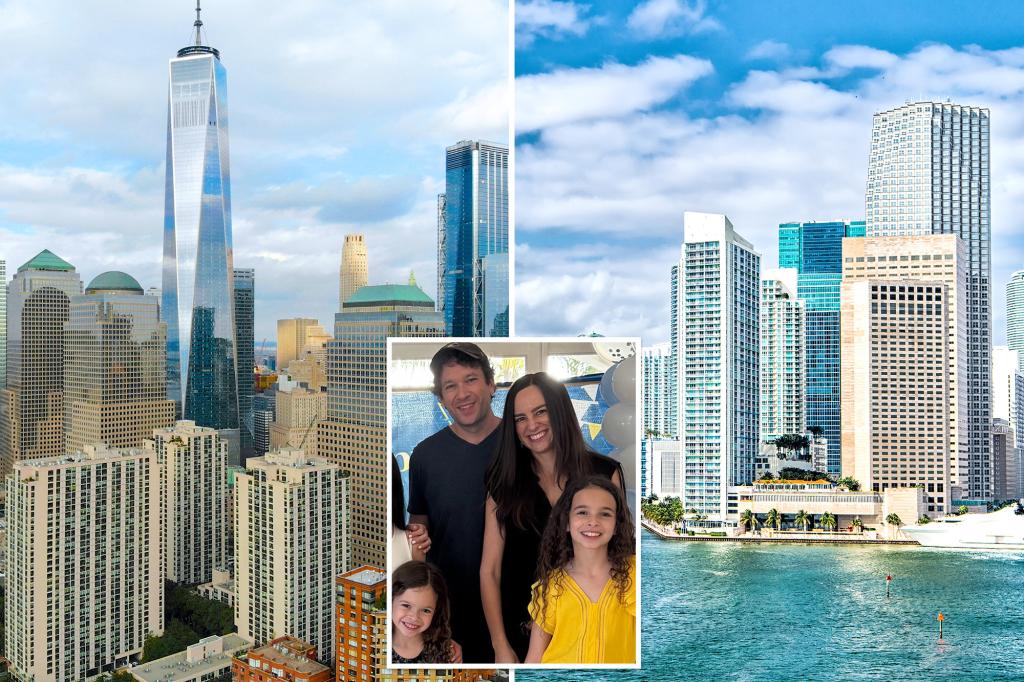Ex-New Yorkers who have fled to Florida say they have no regrets after ditching high taxes and crime for a sunnier, cheaper and safer lifestyle.
A relentless “escape from New York” has hammered the city as more than 125,000 residents left for Florida between 2018 and 2022 and took nearly $14 billion in income with them, according to a new study from the nonpartisan Citizens Budget Commission.
Alex Taub, cofounder of entertainment tech startup Goblintown, relocated to Miami with his wife and two young children from the Upper West Side of Manhattan in July 2020 during the lockdowns – and said rent also was a major factor.
“People thought we were crazy when we were telling them this but it just started getting more and more bleak in New York,” Taub told The Post. “For the same price that we were paying [for a two-bedroom apartment] in New York, we were getting a five-bedroom, four-bathroom house with a pool and a backyard.”
The CBC’s report noted that wealthy New Yorkers have left in droves, with the approximately 26,000 people who moved from New York to Miami-Dade County holding a per-capita income of over $266,000.
Taub, a lifelong New Yorker who was active in the city’s tech scene, said he previously would have considered it “blasphemous” to leave, but has been won over by the work-life balance and lower taxes.
“A lot of friends have moved down here, a lot people in tech, a lot of people in business. The people who stayed are the people with kids,” Taub said. “I’ve never worked harder in my life but I know that at 5 o’clock today I can jump in the pool with my kids and have fun,” he added.
Bryan Goldberg, CEO of Bustle Media, said South Florida “is composed of dozens of small towns with accessible, sane leaders who work hard to improve our lives.”
“I can get on the phone with the Miami Beach mayor at any time, and so can any of my neighbors,” he added. “Once one experiences this sort of relationship with their government, it is impossible to return to the Kafkaesque NYC experience.”
Some relocators are retired “snowbirds” – who fly down south to Florida to escape harsh New York winters – making the move permanent, which happens every year.
A bigger shift took place during the pandemic, when New Yorkers seized on cheap rents in Florida to work remotely, according to luxury retail consultant Melanie Holland. Many found they enjoyed the sun outside with their children and got hooked.
“Why do I want to pay New York state or New York City taxes when I walk out my door and there’s a homeless person, or my Walgreens is shut down because of theft?” many of Holland’s clients told her.
These transplants “hate what New York City has become” – complaining of crime and the stench of weed, she said.
While many miss New York’s energy, there’s no turning back after going through the hassle of selling their apartments and wrangling with the IRS to obtain Florida residency, Holland added.
David Feingold, the Miami-based CEO of Broadstreet Global, said he has at least 20 people in his organization who have put in a request to relocate from New York City to South Florida in the last 18 months.
“Taxes and weather have existed since the beginning of time in New York,” Feingold told The Post. But what changed in the last 18 months is the “cumulative effect” of crime and immigration, he added.
Feingold said that none of the people who moved from New York to South Florida have regretted their decision.
“That’s the amazing thing — I thought I would get complaints about the lack of art and culture that you can only find in New York,” he said.
Instead, the New York transplants have “bought themselves a boat, a bag of golf clubs and they have been able to find alternative outlets for their time.” Feingold added: “People have offset what they lost by leaving New York.”
David Goldberg, a general partner at Miami-based Alpaca VC, said he and his family initially moved to Florida in August 2020 for what they saw as “kind of like a ‘try before you buy’” – and never left.
“It is a significantly better place for me and my family to live from a personal and family perspective,” Goldberg said.
While good weather and no state income tax are both positives, Goldberg said Miami has a unique cultural identity that has grown as the city evolved into a budding tech hub.
“I think we’ve all recruited a bunch of people to come down here,” he added.
Read the full article here

